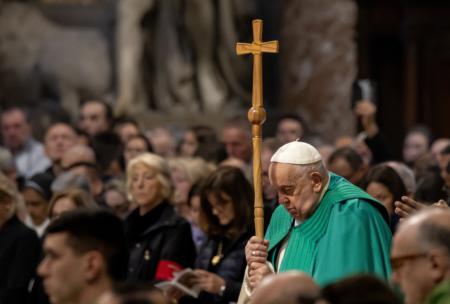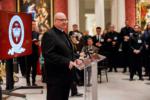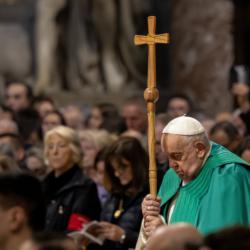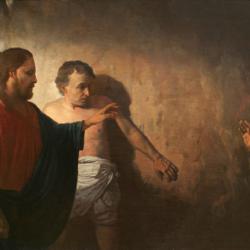Bishops decry move to add 'right' to abortion, same-sex marriage to Virginia constitution
RICHMOND, Va. (OSV News) -- Virginia's Catholic bishops decried a move by a Virginia House of Delegates' committee Nov. 13 to advance proposed constitutional amendments that would add a right to abortion in the state's constitution and repeal a constitutional provision that defines marriage as a union between a man and a woman.
The move by the 22-member Privileges and Elections Committee, which included a third measure to restore the voting rights of people with felony convictions, is preliminary. Even if the amendments are ultimately passed, that process could take years. The measures were tabled last January.
"Adding a 'right' to abortion in Virginia's constitution would enshrine a fundamental tragedy, not a fundamental right," said Bishop Michael F. Burbidge of Arlington and Bishop Barry C. Knestout of Richmond in a Nov. 13 statement released by the Virginia Catholic Conference. "Alarmingly, this proposed policy appears to allow virtually unlimited abortion at any stage of pregnancy."
The bishops expressed concern that "this measure could quite possibly endanger Virginia's parental consent law and its prohibition against partial-birth abortion, and may very well foreclose the possibility of any future measure to protect babies from abortion."
The proposed amendment would guarantee abortion access for Virginians through the first two trimesters. Democrats who back the proposal say it would allow the state to prohibit abortions in the third trimester, but opponents say the amendment doesn't include language that would allow the state to prohibit abortions "if there's a state interest in protecting the life of the unborn," reported 8 News, a Virginia ABC News affiliate.
The bishops were responding to action taken by the Privileges and Elections Committee that would send the measures to the House floor at the beginning of the 2025 legislative session, the first step of a complicated process to amend Virginia's constitution.
Before Virginians can vote on a referendum about their states' constitution, the General Assembly must approve the proposed amendments twice in at least two years, according to The Associated Press. The constitutional amendments put forth by lawmakers would not require the governor's signature if they were approved by voters, which could allow the Democratic-led House and Senate to bypass Republican Gov. Glenn Youngkin, who has vetoed bills related to abortion in the past. However, the multiyear process could also see a change in the Democrats' legislative majorities, affecting the proposed amendments' chances of success.
"Constitutional amendments are typically handled during the regular course of business in odd-numbered years, since they must pass in back-to-back sessions separated by a House of Delegates election," House Minority Leader Todd Gilbert, a Republican, said in a statement objecting to the House committee proposing the measures at a meeting held outside the regular legislative session.
Virginia's next election is November 2025, so the earliest the three amendments advanced by committee could be put on the ballot is November 2026 -- if the measures pass in the state's 2025 and 2026 legislative sessions.
During this November's general election, 10 states had ballot referenda considering abortion either directly or indirectly. Three states -- Florida, Nebraska and South Dakota -- rejected codifying protections for abortion in their constitutions, while voters in Arizona, Colorado, Montana and Missouri approved such constitutional protection for abortion. In Nevada, voters took the first step to abortion being enshrined in their constitution with a "yes" vote on a ballot; the measure would need to pass again in 2026 to be fully approved. Measures that included abortion protections passed in Maryland and New York.
In addition to calling the proposed Virginia amendment on abortion "extreme" and urging lawmakers to propose "policies that affirm the life and dignity of every mother and every child," the Virginia bishops opposed the proposal to remove a constitutional provision protecting traditional marriage approved by voters in 2006.
The state's definition of marriage as between one man and one woman was rendered defunct by the U.S. Supreme Court's 2015 decision in Obergefell v. Hodges legalizing same-sex unions nationwide.
"We affirm the dignity of every person, and we affirm too that marriage is exclusively the union of one man and one woman," the bishops said. "Marriage was created by God with an original design and purpose that each of us is called to preserve and that predates any nation, religion or law."
However, the bishops supported the third proposed amendment, which would make the restoration of voting rights for people who served time for felony crimes automatic.
"This is currently the policy in the vast majority of states," said the bishops. "Moreover, it reflects the teaching of faithful citizenship that each person should participate fully in the political process."
The bishops closed their statement calling the faithful to remain vigilant.
"Though the election season has ended, our deep engagement in decisions that go to the heart of who we are and what we value must continue with determination and zeal," they wrote.


















